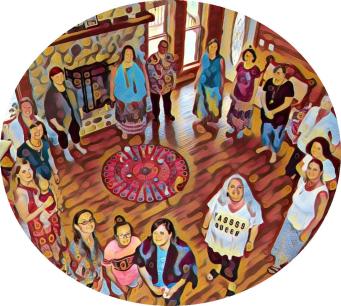A rite of renewal:
Step out under the sky
whether it holds thunder or sun.
Rest your hands against your heart.
Say: I am here.
I am grateful.
Open your arms to the sky.
Feel air soothe you
and wind bless you.
Say: I am radiant in my wholeness.
I am loved.
Sweep your arms down
to touch the Earth (or the floor.)
Say: I am connected.
I belong.
Settle your hands against your belly.
Say: I am centered.
I am powerful.
I am strong.
Return your hands to your heart.
Wait.
The sacred will meet you here.
We pause today in the middle of the road to listen to a mockingbird perched in a crabapple tree by an abandoned house. In clear and rapid succession, it runs through its impressive repertoire: Phoebe, cardinal, chickadee, titmouse, laser-gun, a few extra trills and beeps and back again. We stand, heads cocked and silent, to experience the performance before walking on with a smile, pausing again to inhale deeply as we pass the wild plum trees so sweet and fleeting. I have been preoccupied with projects, feeling bright, creative energy burgeon inside me as it does around me, so many things tug at the mind and ask for time, leaving my dreams restless, my eyes wild, and my mind awhirl with both pressure and possibility, a persistent urgency that calls me on and away and out of being where I am. On the way back home, we stop again because there are five red winged blackbirds, conversing by the neighbor’s pond and we circle through the grass to examine white flowers in the pear trees and to check for peach blossoms (none). I love spring in Missouri, it restores and nourishes me. It reminds me I am home. I sit with my tea listening to a distant chainsaw and the wild turkeys in their rites of spring, a light rustle of wind, and the clinking of my flattened spoon wind-chimes from years gone by. A lone crow glides in to alight on an oak tree beneath the sun. It tips back and forth briefly, wings a satin shimmer in the sunbeams and then drifts away like a black kite through the spring sunshine. I have joked that the description of my next book could be: “I sat. I saw these things.” And, this is true, for I did, and this is my news for today.
Continue reading “Margins for Magic, by Molly Remer”


